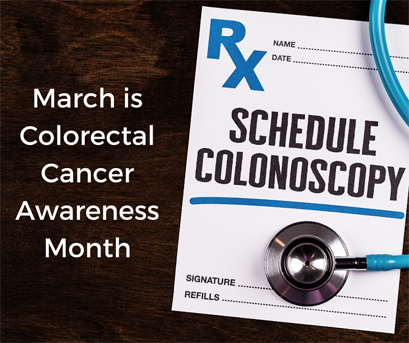45 is the new 50
March 3, 2022
March is Colorectal Cancer Awareness Month. Among cancers that affect both men and women, colorectal cancer (cancer of the colon or rectum) is the second leading cause of cancer deaths in the United States. The good news − if detected early, colorectal cancer is very treatable, and even preventable. The keyword, however, is “early.” By finding and removing precancerous polyps that can develop into cancer, the disease can be stopped before it ever starts.
Colorectal cancer screening truly is an opportunity to prevent cancer. A colonoscopy is one of the most complete tests available. The doctor can see the colon and rectum using a scope on a flexible tube. Even though the procedure can cause trepidation at first, it’s safe, pain-free, and one of the best ways to screen for gastrointestinal diseases.
According to the CDC, the new recommended age to start screening for colorectal cancer has been lowered from age 50 to 45. It’s normal for screening recommendations to be updated over time. The US Preventive Services Task Force, an independent volunteer group of experts in prevention and evidence-based medicine, reviewed new data and concluded that screening for colorectal cancer in adults who are 45 to 49 years old can be helpful.
The CDC warns that oftentimes when in the early stages, colorectal cancer has no symptoms. So, if you’re putting it off because you feel nothing is wrong, that may be a bad idea. The symptoms to watch for with colorectal cancer include: blood in or on the stool, abdominal pain that doesn’t go away, unexplained weight loss, change in bowel habits, and fatigue.
The rate of deaths from colorectal cancer has been dropping over the last couple of decades, mostly due to more people getting screened and catching this disease early when it is most treatable.
You shouldn’t be surprised to hear that with some simple lifestyle choices you can reduce some of the risk factors involved with colorectal cancer, and so many other potential health issues. These lifestyle choices include: maintaining a healthy weight, keeping active, limiting red meats, stopping smoking, and limiting alcohol use.
Many insurance plans cover the cost of screening, but to be sure, please talk with your insurance company about the details.
Don’t let yourself and your family down by skipping the screening. Reach out to your Mille Lacs Health System provider today to assess your need for a colorectal cancer screening
